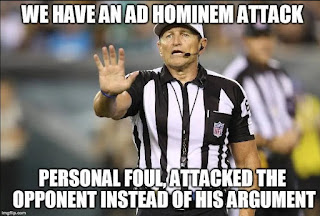The first element in the pursuit of clarity, charity and understanding is clarity. For that reason, from time to time we expose logical fallacies.
We can always tell when people make weak, losing arguments because they resort to ad hominem* attacks, the dumbest of the logical fallacies. An ad hominem argument attacks the person making the argument, not the merits of argument. It's a diversion tactic employed by those who realize their own positions lack merit or rationality. It's an excuse for ignoring the weaknesses of their own arguments.
People who depend on others' ignorance, apathy and/or irrationality to sustain their arguments usually end up resorting to ad hominem arguments because their arguments cannot withstand scrutiny.
It's a common tactic today among critics of the Restoration. They accuse Joseph Smith of personal failings as an excuse to justify their rejection of the Restoration, including the Book of Mormon. As Oliver Cowdery explained, "an excuse was wanted--and an excuse was had."
A month before he died, Joseph Smith responded to the ad hominem arguments made against him throughout his life.
I never told you I was perfect— but there is no error in the revelations which I have taught— must I then be thrown away as a thing of nought?
During Joseph's lifetime, critics made incessant ad hominem arguments against him and his family and associates. The 1834 book Mormonism Unvailed was replete with such arguments. Even today, critics and some faithful scholars reiterate the ad hominem arguments.
In response, Oliver Cowdery wrote Letters II and III. In Letter II, he pointed out that the biblical prophets whom modern Christians claimed to believe had all been persecuted during their lives. He then observed
But in reviewing the lives and acts of men in past generations, whenever we find a righteous man among them, there always were excuses for not giving heed or credence to his testimony.
The people could see his imperfections; or, if no imperfections, supposed ones, and were always ready to frame an excuse upon that for not believing.— No matter how pure the principles, nor how precious the teachings—an excuse was wanted—and an excuse was had....
The savior came in form and fashion of a man; he ate, drank, and walked about as a man, and they said “Behold, a man gluttonous, and a wine bibber, a friend of publicans and sinners!”
You see an excuse was wanting, but not long wanting till it was found—who would follow a dissipated leader? or who, among the righteous Pharisees would acknowledge a man who would condescend to eat with publicans and sinners?
This was too much—they could not endure it.
An individual teaching the doctrines of the kingdom of heaven, and declaring that that kingdom was nigh, or that it had already come, must appear different from others, or he could not be received.
If he were athirst he must not drink, if faint he must not eat, and if weary he must not rest, because he had assumed the authority to teach the world righteousness, and he must be different in manners, and in constitution, if not in form, that all might be attracted by his singular appearance: that his singular demeanor might gain the reverence of the people, or he was an imposter—a false teacher—a wicked man—a sinner—and an accomplice of Beelzebub, the prince of devils!
https://www.josephsmithpapers.org/paper-summary/history-1834-1836/58
_____
The New Testament relates the story of Saul/Paul and how people used his persecution of the saints against him even after his conversion. Even the saints initially rejected him because of his past conduct.
We meet Saul when he participated in the stoning of Timothy.
57 Then they cried out with a loud voice, and stopped their ears, and ran upon him with one accord,
58 And cast him out of the city, and stoned him: and the witnesses laid down their clothes at a young man’s feet, whose name was Saul.
59 And they stoned Stephen, calling upon God, and saying, Lord Jesus, receive my spirit.
60 And he kneeled down, and cried with a loud voice, Lord, lay not this sin to their charge. And when he had said this, he fell asleep.
(Acts 7:57–60)
2 And devout men carried Stephen to his burial, and made great lamentation over him.
3 As for Saul, he made havoc of the church, entering into every house, and haling men and women committed them to prison.
(Acts 8:1–3)
1 And Saul, yet breathing out threatenings and slaughter against the disciples of the Lord, went unto the high priest,
2 And desired of him letters to Damascus to the synagogues, that if he found any of this way, whether they were men or women, he might bring them bound unto Jerusalem.
(Acts 9:1–2)
_____
* from wikipedia:
Ad hominem (Latin for 'to the person'), short for argumentum ad hominem, is a term that refers to several types of arguments, most of which are fallacious. Typically this term refers to a rhetorical strategy where the speaker attacks the character, motive, or some other attribute of the person making an argument rather than attacking the substance of the argument itself. This avoids genuine debate by creating a diversion to some irrelevant but often highly charged issue. The most common form of this fallacy is "A makes a claim x, B asserts that A holds a property that is unwelcome, and hence B concludes that argument x is wrong".


No comments:
Post a Comment